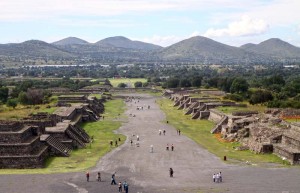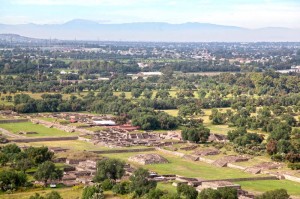
Explore small pyramids, alters and residences as you make your way North up the Avenue of the Dead
One of the first things you notice when you enter the site at the main entrance is the massive Avenue of the Dead. Named by the Aztecs who assumed the city long after the original builders had left. These new residents named the roadway after the tombs at the side of the expansive walkway. However they weren’t tombs but rather small residences and pyramids lining the grand walkway.
Like all great streets, it connects important spots in a city. This Avenue connects the major ceremonial world that you will explore, from the Citadel in the South to The Great Pyramid of the Sun and then onward to the Pyramid of the Moon.
The road itself runs for more than 4 KMs (2.5 miles) although Archeologists believe that it was almost double that in its prime. The width of the street varies from 40 to 95 meters. It was built over a manmade channel to drain the rainwater into the Rio San Juan. The alignments of the Avenue and of the attached buildings and pyramids is aligned astronomically and gives sway to the claims that the Avenue and city were very planned and organized before they were built. It is approximately 16 degree North West and is aligned wit
h the setting sun on specific religious dates.
The Avenue is not a single level road; it rises as it heads north. The Rio San Juan was diverted to cross at right angles with the Avenue, so a bridge roadway leads pedestrians across the water. As you move north you enter stepped plazas; you walk up steps to the wall then down to the plaza; then up again. The framework of residences are on both sides of the roadway some with elaborate carvings and small stepped pyramids.
Be sure to visit the mural of the Jaguar located near the Pyramid of the Sun on the Western side of the Avenue.

